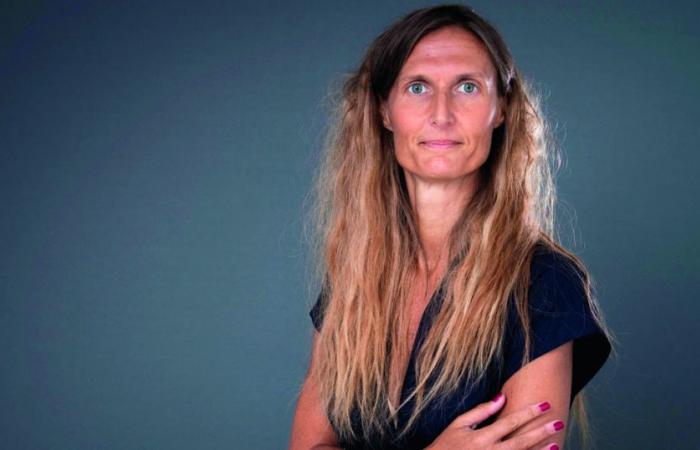This fine negotiator advises States on their financial policy. She reveals the mysteries of a fascinating profession, more relevant than ever.
As in the song by Brigitte Bardot, On the abandoned beachAnne-Laure Kiechel has been “putting away her holidays” for two weeks: she knows that next summer, “everything will bloom again” in her white-walled house on Patmos. It is on this island, bathed by the Aegean Sea, that she recharges her batteries every year with her tribe. “An essential ritual break,” she sighs with a smile. The rest of the time, the economic advisor, who made a name for herself by helping the former Greek Prime Minister, Alexis Tsipras, to restructure his loans in the face of the explosion of public debt in 2009, subjects herself to an Olympic discipline.
Up at 5:30 in the morning, she takes a daily Pilates class and immerses herself in a geopolitical news feed, before heading to her office or an airport to answer the call of governments, eager for her advice. “After years of pandemics that limited travel, I started traveling again, now staying in one place for longer. To do this job well, you have to immerse yourself in the countries that are asking for your help and have multiple meetings there,” she explains from her HQ on Rue de Penthièvre in Paris, at the heart of the golden triangle of finance and political power.
” data-script=”https://static.lefigaro.fr/widget-video/short-ttl/video/index.js” >
Unique expertise
To help states finance their investments or expenses at the best rates, Anne-Laure Kiechel and her teams offer them a complete toolbox of tailor-made services, ranging from fundraising to the orientation of public policies. Reform projects, choice of taxes to be implemented, five-year development plans… The entire situation of the country is examined in detail to find the solutions that best suit it. “We offer both public policy consulting, in several disciplines, debt structuring and fundraising consulting, based on a dedicated team, and a research department whose macroeconomic analyses serve states and businesses.”
Founded in 2019, her firm, Global Sovereign Advisory (GSA), has sprung up like a mushroom after the rain. In just five years, forty-five employees have joined the high priestess of sovereign advice. Nearly thirty-five countries, a handful of public companies and large groups now trust her. And GSA’s field of action thus extends over more than a dozen time zones, from the Gulf countries, to the Balkans, to French-speaking and English-speaking Africa as well as to Latin America and the Caribbean.
Lightning trajectory
When she left her last employer, the prestigious Rothschild & Co bank in Paris, in 2019, the financier was far from imagining that less than a year later she would be participating in calls for tenders to restructure the most astronomical debts on the planet. Even less that she would be invited onto the set of Dailyat the height of the health crisis, to answer Yann Barthès’ questions on the explosion of public deficits. Today, she is transformed into a superstar when she arrives in force – with around fifteen colleagues – at the two annual general meetings of the World Bank and the International Monetary Fund (IMF), the world’s main multilateral donors.
“For a week in April and October, the entire microcosm of the financial ecosystem converges in Washington, delegates, bankers, rating experts, economists and lawyers, and we take advantage of this to support our client countries, advance issues and take the pulse of the economy during plenary sessions,” she confides. As a child, she dreamed of becoming a piano virtuoso, practicing music theory six hours a day under the tender gaze of her parents, before imagining a destiny as a humanitarian doctor. After an itinerant adolescence between Switzerland, France, the United States and Germany, she landed in preparatory class at the Lycée Louis-le-Grand in Paris, then at HEC, in a dual degree with the University of Management of Saint-Gall, in Switzerland.
We operate like a doctor who identifies blockages before implementing the appropriate treatment.
Anne-Laure Kiechel
In 1999, her choice was made: she would be a banker. Not in mergers and acquisitions, the most popular field among young recruits in investment banks, but to “make debt”. In other words, raise funds from investors for private companies or public treasuries. Lehman Brothers welcomed her with open arms in the capital markets department in New York, then in London and Paris. The subprime crisis forced her to pack her bags on September 15, 2008, the day the bank declared bankruptcy.
The episode, she says, “branded her for life.” But her experience opened the doors of Rothschild in 2009 to provide ratings consulting, before creating a practice of consulting for states, a market then dominated by Lazard bank. In 2014, she broke the glass ceiling by becoming the first managing partner of the bank on Avenue de Messine. Under her leadership, Rothschild won its first sovereign mandate, Ivory Coast. Other trophies followed, such as Argentina, Chile, Albania, Ukraine and Senegal, before Greece in 2016. In 2018 – she was 43 years old – the magazine Vanity Fair the class in the pantheon of the “fifty most influential French people in the world”, right next to a certain Emmanuel Macron…
Also readTatyana Franck, President of the New York Alliance: “Building a bridge between the Americas and French-speaking cultures”
A global phenomenon
Over time, the shadow advisor has acquired some certainties. “We operate like a doctor seeking to diagnose blockages before implementing an appropriate treatment, then determining the financing, reforms or solutions to consider,” she explains. Unsurprisingly, needs are exploding. As is the level of global public debt, close to 90,000 billion dollars at the end of 2023.
“The world is much more indebted: previous shocks have not been completely absorbed, interest rates have risen to nearly 3% in mature economies and are close to double digits in many African countries, which are now forced to spend more on interest payments than on education, health or investment,” the leader explains in broad outline. Result: many emerging countries are seeking credit enhancements and subsidized financing from multilateral institutions and major donors such as the Gulf countries, India and Turkey. The major works are only just beginning…






